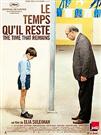|
|
||||
|
|
by Donald Levit  Fielding more diatribes than cinema questions from the audience, Elia Suleiman was patient, gracious and humorous. The most renowned of Palestinian-Israeli auteurs iterated that his more than “semi-autobiographical trilogy” is “not a documentary . . . about the Together with his Cannes-commissioned short Awkward/Irtebak from the 2007 omnibus To Each His Own Cinema/Chacun son cinéma, these three related features are the Opening Night and day after of Mapping Subjectivity: Experimentation in Arab Cinema 1960-Now, of which this is installment one of three planned by the Museum of Modern Art. In subtitled Arabic and Hebrew, they are: The Time That Remains/Al Zaman al Baqi ( This is the first time the three can be seen together, and they and the program’s many other works are “organized in clusters that reflect thematic and aesthetic kinship, intangibles . . . rather than connections of chronology and geography.” Such ordering applies as well to the writer-director-actor’s three, which, though progressing in some sense in the sequence afforded by passing time, are yet individually and collectively a mosaic to appreciate which one must step back to overview. Cutting with calculated randomness from seemingly unrelated scene to seemingly unrelated scene, they comically repeat sequences or settings, with slight variations, within each film or from one film to another. Likened to Buster Keaton but equally recalling Jacques Tati, actor Suleiman is omnipresent as ES, as boy, child, young man and present-day returnee, deadpan, quizzical, wordlessly observing his family and the insane world, often through doorways or windows. Chronicle of a Disappearance is the least effective, in part because, in addition to repeated tiring conversations among friends on a fishing boat, too much of it reverts to Adan (Ola Tabari), introduced in payphone calls effectively indicating the difficulty for an Arab woman to rent in a Jewish neighborhood. True, for “ Much of the films’ impetus comes from Suleiman’s father Fuad’s (Saleh Bakri) diaries and mother Nazira’s (Shafika Bajjali, at eighty) letters to family who fled Israeli occupation to SPOILER ALERT Many in the Arab community leave their homes as Israeli army units assume command over Nazareth on July 16, 1949. Resistance is token, if that, but even so “the gun-maker” Fuad stays, is arrested and beaten, possibly the origin of lifelong ill health and relatively young death in a moving scene with his teen son. Family sequences thereafter center around the home, loving if not talkative or demonstrative. Years pass, interlaced with insets of black humor: a crazed elderly neighbor who fails to strike matches for self-immolation (balanced by a man [Alex Bakri] who does blow his brains out); a tank-turret cannon meticulously keeping a bead on a pacing cell-phoner (Ehab Assal); disco dancers oblivious to a wistful soldier blaring curfew orders. Some involve Suleiman, as a boy dumping plates of lentils, wordlessly defying a headmaster upset by his anti-U.S. slogans while classmates chorus Israeli songs, or as an adult with equally non-commenting Jamel (Jamel Daher) of the Holyland souvenir shop. If technique grows wearisome over three whole films, still the rapid-fire, dry, visual vignettes from some theater of the absurd do not obscure the picture of a community that cannot find its way. The toll is great, even while on the inner, personal level life goes on, at once petty, grand and, in the larger scheme, beyond the mad nonsense of politics. (Released by IFC Films; not rated by MPAA.) |
||
|
© 2026 - ReelTalk Movie Reviews Website designed by Dot Pitch Studios, LLC |



